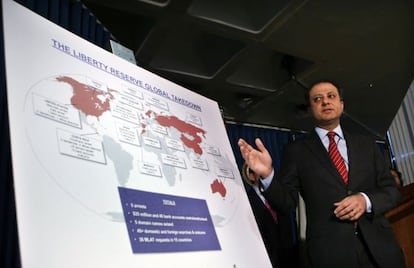Spain and US authorities dismantle “PayPal of organized crime”
Founders of global-scale money-laundering operation arrested in Madrid

Federal prosecutors in New York have blown the lid off a system of financial fraud operating on a global scale. Liberty Reserve — an online currency exchange that required only an email address to register — was used over a seven-year period to make 55 million transactions totaling over six billion dollars.
The money is suspected to have originated from credit card fraud, identity theft, investment fraud, piracy, child pornography and drug trafficking, according to Spanish authorities.
The founder of the service, Arthur Budovsky, was arrested with his number two, Azzedine el Amine, at Madrid-Barajas Airport last Friday on money-laundering charges. Both men are naturalized citizens of Costa Rica.
"Liberty Reserve had become the financial core of cybercrime," said prosecutor Preet Bharara, who explained how third parties moved tens of millions of dollars though accounts of dubious origin in Spain, Cyprus, Russia, Hong Kong, China, Morocco and Australia. "This operation is an important step toward reining in the 'Wild West' of illicit internet banking." The US Treasury defined Liberty Reserve as an international money-laundering organization under the Patriot Act. Unofficially, Liberty Reserve has been described as "the PayPal of organized crime."
"If Al Capone were alive today, this is how he would be hiding his money," the head of the Internal Revenue Service's criminal investigation division in Washington, Richard Weber, said. "Our efforts today shatter the belief among high-tech money launderers that what happens in cyberspace stays in cyberspace."
If Al Capone were alive today, this is how he would be hiding his money"
The investigation and subsequent arrests of Liberty Reserve's founders in Spain was carried out by the money-laundering arm of the National Police's UDEF financial crimes unit. "Liberty Reserve is a type of virtual bank for criminals," noted a senior officer, who explained that the organization had front companies in Nigeria, Malaysia, Russia and Vietnam.
Liberty Reserve charged a commission of one percent to the recipient of the transferred funds, up to a maximum of 1.98 dollars per transaction, meaning fees were essentially only charged for the first 200 dollars of any transfer.
US authorities began investigating Liberty Reserve several years ago and dispatched a judicial commission to Spain to look into the activities of the two founders of the company, Budovsky and El Amine, who held several Spanish bank accounts. The men were arrested in transit from Morocco to Costa Rica and jailed to await extradition. In addition to those of Budovsky and El Amine, further arrests were made in Costa Rica and New York, including that of Vladimir Kats, an alleged co-founder of the Brooklyn-based company.
Liberty Reserve described itself as "the oldest, safest and most popular processor." It is headquartered in Costa Rica, which France recently added to its list of international tax havens.
Costa Rica attorney Pablo González said that 10 other people are still under investigation. Raids at 50 offices and three private addresses last week led to the seizure of documents that will be handed to US authorities and three vehicles, including a Rolls-Royce.
González said the financial regulator in Costa Rica, Sugef, had denied Liberty Reserve a license in 2011 over concerns about its methods. The company then closed its physical offices in the country and became a purely internet-based operation.
Tu suscripción se está usando en otro dispositivo
¿Quieres añadir otro usuario a tu suscripción?
Si continúas leyendo en este dispositivo, no se podrá leer en el otro.
FlechaTu suscripción se está usando en otro dispositivo y solo puedes acceder a EL PAÍS desde un dispositivo a la vez.
Si quieres compartir tu cuenta, cambia tu suscripción a la modalidad Premium, así podrás añadir otro usuario. Cada uno accederá con su propia cuenta de email, lo que os permitirá personalizar vuestra experiencia en EL PAÍS.
¿Tienes una suscripción de empresa? Accede aquí para contratar más cuentas.
En el caso de no saber quién está usando tu cuenta, te recomendamos cambiar tu contraseña aquí.
Si decides continuar compartiendo tu cuenta, este mensaje se mostrará en tu dispositivo y en el de la otra persona que está usando tu cuenta de forma indefinida, afectando a tu experiencia de lectura. Puedes consultar aquí los términos y condiciones de la suscripción digital.








































